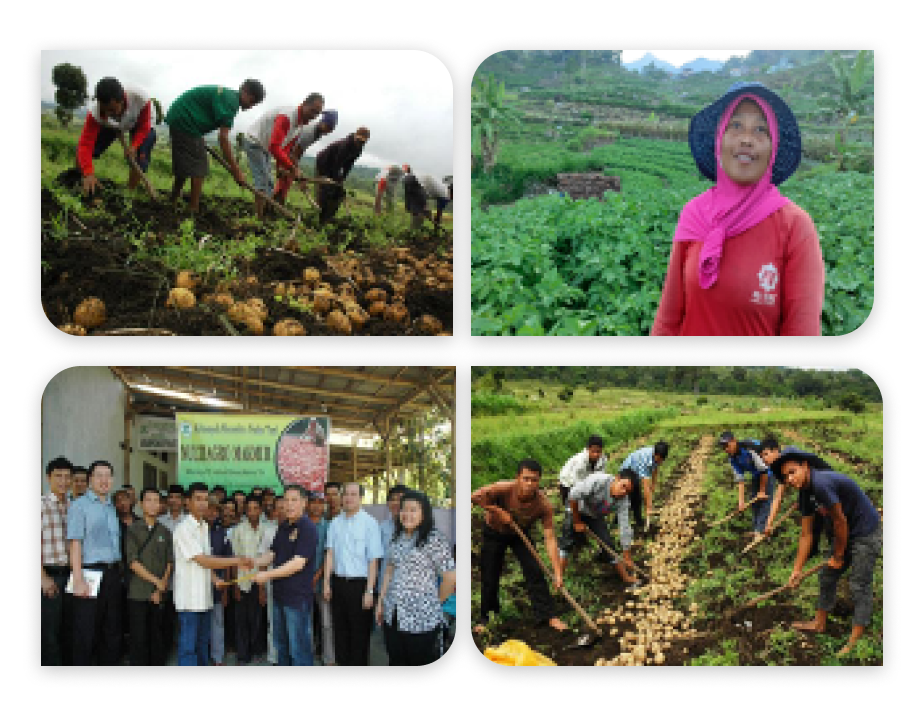WORKING
GROUP - POTATO
Context:
Potatoes had become an increasingly important crop in the country, driven by rising demand for processed potato products like chips and snacks, as well as the expansion of quick-service restaurants. The government and private sector were investing in potato farming and processing infrastructure to support domestic production and reduce reliance on imports. Additionally, efforts were being made to introduce improved potato varieties and modern farming techniques to increase yields and quality. However, challenges such as weather-related risks and limited access to technology and knowledge for smallholder farmers persisted.
Potato Working Group is a collaborative endeavor involving private sector leaders, governmental entities, non-profit organizations, and potato smallholders, passionately committed to driving productivity enhancements and improving livelihoods within the potato industry through sustainable and inclusive practices. Potato WG's primary goal is to empower smallholder potato farmers with the knowledge, resources, and ethical farming techniques essential for boosting potato yields, mitigating environmental impact, and ensuring equitable economic gains. Through an array of initiatives encompassing advanced agronomic practices, access to high-quality seeds, integrated pest management, and equitable market access, the initiative not only seeks to increase smallholders' productivity and income but also promotes responsible and environmentally conscious potato farming. Potato WG serves as a testament to the transformative power of public-private partnerships, demonstrating how collective efforts can affect positive change, secure the future of the potato industry, and uplift the well-being of rural communities in a sustainable and inclusive manner.
Activities :
- - Enhancing farmers’ capacity, building on GAP through monitoring and mechanization.
- - Producing high-quality industrial potato seeds.
- - Facilitating access to capital and markets.
- - Developing cultivation in Sumatra.
Impact :
- - 4500 farmers participating.
- - 2966 ha of land.
- - 100% smallholders has access to off-taker.
- - 100% smallholders has access to capacity building.
- - Average income around IDR 3.900.000/month
- - Productivity around 13 ton/ha
CASE STUDY - POTATO - INDOFOOD

Program Kemitraan Petani Kentang - Memberikan solusi kebutuhan pangan dan kontribusi bagi kesejahteraan masyarakat dan lingkungan secara berkelanjutan, dan meningkatkan stakeholders’ values secara berkesinambungan.
BEFORE AND AFTER
INCLUSIVE CLOSED LOOP IMPLEMENTATION
| Indicator | Before | After |
|---|---|---|
| Production/Productivity | Farmers have a lower quality & lower number (12ton/ha) of production | Farmers now have a better quality of production & higher number of productivity (14ton/ha) due to GAP Adoption guided by company |
| Market Access | Market uncertainty for farmers & dependance for gatherer in free market | Indofood as an offtaker provide a more safe & guaranteed market for farmers |
| Financial | Farmers provide capital at the start of farming process including seeds buying from seeds breeder | Financial instutions provided farmers with a more fair loan that can be paid after the harvest and farmer have the alternative from financial institution to support the farming process (KUR and loans) |
| Indicator | Before | After |
|---|---|---|
| Capability Building | Farmers run the farming process only accompanied by field instructor Dept of Agriculture, no GAP training provided to farmers | Indofood provided additional field instructor for partnered farmers in every working area, facilitated GPA trainings for partnered farmers |
| Social Impact | Farmers have the average number of income | Number of farmers' income are increased by 15-20% due to higher productivity |
| Indicator | Before | After |
|---|---|---|
| Innovation and Infrastructure | Farmers have lack of access to technology usage to help them solve fields problem and to monitor the condition of the farm | Farmers now have the access to well-developed mobile application to support farmers in farming operations (connecting farmers to field instructor for guidance and to monitor the actual condition of the farm) |
| Sustainability | Cropping pattern done by farmers without market based decision & demand | Farmers were facilitated by field instructor to run a cropping pattern based by GAP for a more sustainable farming practices |